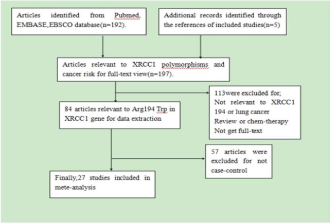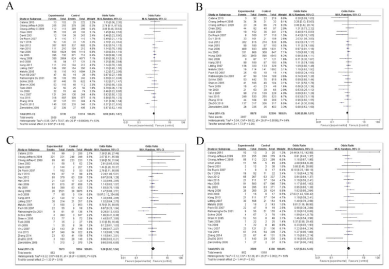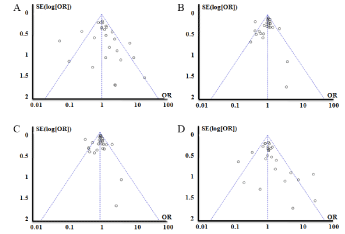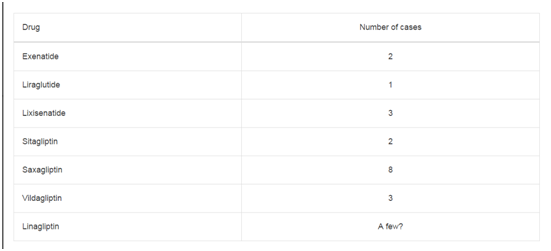Research Article
The Arg194Trp Polymorphism in the XRCC1 Gene Have No Associated With Lung Cancer Risk: A Meta-Analysis
Han Su1#, Yan Q1#, Qiang Hu2, Zhang M1, Sun J1, Na Li1, Huo L1, Zhiqin Gao1# and Mei-Hua Qu1#*
1Department of Pharmacology, Weifang Medical University, China
2Department of Pediatric Surgery, Weifang People’s Hospital, China
#Authors contributed equally in the paper
*Corresponding author: Mei-Hua Qu, Department of Pharmacology, Weifang Medical University, China
Published: 29 Aug, 2016
Cite this article as: Han Su, Yan Q, Qiang Hu, Zhang M,
Sun J, Na Li, et al. The Arg194Trp
Polymorphism in the XRCC1 Gene
Have No Associated With Lung Cancer
Risk: A Meta-Analysis. Clin Oncol.
2016; 1: 1062.
Abstract
X-ray repair cross-complementing group 1(XRCC1) gene Arg194Trp polymorphism has been
implicated in correlation with risk of lung cancer in some published studies, however, results of
different studies have been inconsistent and some are totally different. In this study, we conducted
a cumulative meta-analysis to get more comprehensive results of XRCC1 polymorphism of
Arg194Trp and the risk of lung cancer from 27 case-control studies searching through the Pubmed,
EBSCO and Embase database up to April 1, 2016. The meta-analysis was carried out by the Revman
manager 5.3 Meta-Analysis software and the odds ratio (OR) with 95 % confidence interval (CI) was
used to estimate the pooled effect. The results involving 9730 lung cancer patients and 13314 healthy
controls revealed that XRCC1 Arg194Trp polymorphism was not associated with lung cancer risk
[(OR= 0.90, 95 % CI=0.8-1.10) for ArgTrp vs. ArgArg; (OR=1.20, 95% CI=0.92-1.56) for TrpTrp
vs. ArgArg; (OR=0.94, 95 % CI=0.83-1.07 for (TrpTrp+ArgTrp) vs. ArgArg]. The sensitivity and
subgroups analysis showed that the results were robust and not affected by any single study with no
publication bias. Our meta-analysis suggested that XRCC1 Arg194Trp polymorphism is not related
with lung cancer.
Keywords: X-ray repair cross-complementing group 1; XRCC1; Polymorphism; Lung cancer;
Meta-analysis
Introduction
Cancer is a major public health problem all over the world. Currently, lung cancer has become
the leading cause of cancer death worldwide, with the rate as high as more than one-quarter (27%)
of all cancer deaths due to lung cancer [1,2]. In 2015, an estimated 221,210 new cases of lung and
bronchial cancer will be diagnosed, and 158,040 deaths are estimated to occur. Studies showed that
various factors including tobacco and alcohol have been associated with lung cancer pathogenesis
[3]. DNA repair genes are considerable factors in the prevention of genomic injury and sequential
carcinogenesis. The single nucleotide polymorphism (SNP) of DNA repair genes might be able to
impair DNA repair ability and have been suggested to be associated with cancer risk [4-6]. X-ray
repair cross-complementing group 1(XRCC1) is a protein that function in the repair of single strand
breaks, playing a central role in the base excision repair (BER) pathway by interacting with other
DNA repair proteins [7]. There are relatively common XRCC1 SNPs: amino acid substitutions at
codon 194(Arg194Trp), codon 280 (Arg280His), and codon 399(Arg399Gln). In 2001, David-Beabes
and [8] and Ratnasinghe [9] found that Arg194Trp polymorphism might contribute to lung cancer.
There are more studies showed the relationship of XRCC1 polymorphism with the susceptibility
of lung cancer. However, some researches showed that there was no association between XRCC1
gene Arg194Trp polymorphism and risk of lung cancer [10,11]. To reach conclusive results, several
meta-analysis studies were conducted by combining results across studies from literatures through
pooling analysis. However, these previous meta-analysis investigations were still not consistent
[12,13]. Furthermore, new published research studies were coming out, but the inconclusive results
are still a problem to be resolved. Therefore, the association of Arg194Trp with lung cancer risk
remains inconclusive and unclear.
In order to have more comprehensive and precise results, we conducted cumulative metaanalysis
to explore the association between Arg194Trp SNP and lung cancer risk based on 27 casecontrol
studies.
Figure 1
Figure 2
Figure 2
Forest plots for the association of XRCC1 Arg194Trp polymorphism with lung cancer risk. A. Trp/Trp vs Arg/Arg; B. Arg/Trp vs Arg/Arg; C. (Arg/Trp+Trp/
Trp) vs Arg/Arg; D. Trp/Trp vs Arg/Trp.
Material and Methods
Publication search
Pubmed, EBSCO, EMBASE Data were searched to identify
studies that had investigated the association between XRCC1
polymorphisms and the risk of lung cancer from inception through
to April, 2016. The broad search terms were: “XRCC or X-ray repair
cross complementing 1 and SNP or polymorphism and DNA repair
or variant and lung cancer or lung neoplasm or cancer of the lung”.
The reference also list of the included articles and relevant metaanalyses
were manually searched.
Inclusion criteria
All data from studies included in this meta-analysis followed
the criteria: [1] the papers should include lung cancer risk and
polymorphisms of XRCC1 Arg194Trp [2]; the papers should be
published between January 1980 and April 2016 [3]; only the casecontrol
studies and cohort studies were considered [4]; the number
of genotype distribution in both case and control group were directly
reported or calculated from the reported data [5]; the published
language was English.
Data extraction
Two investigators extracted data from each included studies A
third reviewer’s decision was required when there was disagreement
between the two reviewers. The following data were collected: the
surname of first author, publication year, Ethnicity, genotypingmethods,
case number of XRCC1 and genotyping distribution,
control number of XRCC1 and genotyping distribution.
Statistical analysis
Four genetic models [ArgTrp vs. ArgArg; TrpTrp vs. ArgTrp;
TrpTrp vs. ArgArg; (TrpTrp +ArgTrp) vs. ArgArg] were used
to calculate the pooled odds ratio (OR) and its 95 % confidence
interval (CI) to present the strength of associations between XRCC1
Arg194Trp polymorphism and risk of lung cancer. The fixed effects
model is used when the effects are assumed to be homogenous, while
the random effects model is used when they are heterogeneous. For
heterogeneity among included studies I2≥50 % when detected by I2
statistics (Figure 2) [14,15], random-effects model was used instead.
The funnel plot was drawn to assess publication bias and Egger’s
test was used to test for the funnel plot symmetry. All the statistical
analyses were performed with Review Manager (Version 5.3, The
Cochrane Collaboration).
Figure 3
Figure 3
Funnel plots for the association of XRCC1 Arg194Trp polymorphism with lung cancer risk. A. Trp/Trp vs Arg/Arg; B. Arg/Trp vs Arg/Arg; C. (Arg/Trp+Trp/
Trp) vs Arg/Arg ; D. Trp/Trp vs Arg/Trp.
Results
Selection of studies
Based on our system search strategy, 197 (192 and 5 additional)
potentially studies form designated databases were identified after
careful examination of the titles and abstracts. All this 197 studies
are articles relevant to XRCC1 polymorphisms and cancer risk for
full-text view. After excluded 113 papers due to the reasons of not
relevant of XRCC1 194 or lung cancer/ reviews/ concerning therapy/
cannot get full text from the original 197 studies, eighty four studies
remained in this analysis. Another 57 papers were excluded for the
studies were not case-control study. Finally, a total of 27 studies
Catana et al. [16], Chang et al. [17], Chen et al. [18], David-Beabes et
al. [9], De Ruyck et al. [19], Du et al. [20], Guo et al. [21], Han et al.
[22], Hao et al. [23], Hu et al. [24], Hung et al. [25], Improta et al. [26],
Kang et al. [27], Li et al. [28], Matullo et al. [29], Pachouri et al. [30],
Ratnasinghe et al. [10], Schneider et al. [31], Shen et al. [32], Tanaka
et al. [33], Yin et al. [34], Yin et al. [35], Yoo et al. [36], Zhang et al.
[37], Zhu et al. [38], Zienolddiny et al. [39], were included in the final
meta-analysis, all were written in English.
Study characteristics
A total of 9730 lung cancer patients and 13314 controls from 27
studies were included in this meta-analysis. In all reports, classical
polymerase chain reaction restriction fragment length polymorphism
(PCR-RFLP) was utilized for detection of XRCC1 polymorphisms
in the peripheral blood cells. The relevant characteristics of the 27
eligible studies are listed in (Table 1).
Arg194Trp allete and lung cancer risk
XRCC1 Arg194Trp polymorphism [ ArgTrp vs. ArgArg; TrpTrp
vs. ArgTrp; TrpTrp vs. ArgArg; (TrpTrp +ArgTrp) vs. ArgArg]
Meta-analysis based on fixed-effects model showed that there was
no association of XRCC1 Arg194Trp polymorphism with risk of
lung cancer [(OR= 0.90, 95 % CI=0.8–1.10) for ArgTrp vs. ArgArg;
(OR=1.20, 95 % CI=0.92–1.56) for TrpTrp vs. ArgArg; (OR=0.94, 95
% CI=0.83–1.07 for (TrpTrp+ArgTrp) vs. ArgArg] (Figure 2). No
association was observed between the Arg194Trp polymorphism and
lung cancer risk (OR=0.94, 95 % CI=0.83–1.07; Arg/Trp and Trp/Trp
genotypes combined versus Arg/Arg genotype.
Publication bias
No obvious publication bias was revealed after assessing the
funnel plot for the eligible studies (Figure 3). Furthermore, the results
from Egger’s test for the studies evaluating XRCC1 Arg194Trp in
lung cancer did not reveal obvious publication bias (Egger’s=0.33).
The shape of funnel plots seemed to be approximately symmetrical
(Figure 3). Both Egger’s test results suggested no evidence of
publication biases existed in this meta-analysis (Table 2). The
presence of publication bias showed that not significant or negative
finding remain unpublished.
Table 1
Discussion
Meta-analysis is a statistical method of combining results
from literatures to resolve discrepancy in association studies [40].
We summarized the previous studies to estimate the association
between the polymorphisms of XRCC1 codon 194 and lung cancer
risk. Previously, many people made a subgroup analysis, analysis of
each ethnicity of meta analysis. Considering the number of samples,
we didn't see the each ethnicity of the relationship between XRCC1
polymorphism and lung cancer susception. In this study, we choose
researches published only in English to avoid bias in some aspects.
In further study, the understanding of the people went a step further;
we may have further subgroup analysis. The meta-analysis of 27 case
control studies indicated that XRCC1 Arg194Trp polymorphism
is not associated with lung cancer risk within human populations,
which was also supported by cumulative meta-analysis and sensitivity
analysis [41].
Compared to previously meta-analyses, the included studies of our
analysis are should provide a stronger statistical power and have less
risk of bias. Hence, the results are more precise and comprehensive.
However, we should mention the test of heterogeneity, an important
aspect on the evaluate quality of a meta-analysis, which may be
produced due to unreliable data. Therefore, we will mention original
statistical carefully. What’s more, we found that the results remained
the similar when studies were accumulated. Now, lung cancer
patient mainly treated by chemotherapy because of there is no better
treatment. People are also exploring actively the relationship between
lung cancer and gene in order to treat lung cancer better. Several
limitations should be pointed out in our meta-analysis. The funnel
plot was not very symmetry despite there is no obvious publication
bias. For another, this meta-analysis was based on unadjusted
data, lacking of detailed genotype information stratified by main
confounding variables from original studies.
Conclusion
In summary, we observed there is not associated between XRCC1 codon 194 with lung cancer, which is consistent with Kiyohara et al. [42]. These results were not influenced by any single study. We should be more focused on other factors associated with lung cancer such as microenvironment of lung cancer. Given a handful of studies included in this meta-analysis, the present conclusion should be considered with more high-quality prospective cohort studies next.
Acknowledgements
This project was supported by grants from National Natural Science Foundation of China (81274093, Zhiqin Gao), Shandong Province Natural Science Foundation (ZR2015HL128, Mei-Hua Qu), Weifang Science Foundation(Qiang Hu), Health department of shandong province (2014WS0478, Mei-Hua Qu).
References
- Wang YD, Yang HY, Li HS, Li L, Wang HY, Zheng YX. Association between X-ray repair cross complementing group 1 codon 399 and 194 polymorphisms and lung cancer risk: A meta-analysis. Cancer Letters. 2009; 285:134–140.
- Zhang J, Zeng XT, Lei JR, Tang YJ, Yang J. No association between XRCC1 gene Arg194Trp polymorphism and risk of lung cancer: evidence based on an updated cumulative meta-analysis. Tumor Biol.2014; 35: 5629–5635.
- Siegel RL, Miller KD, Jemal A: Cancer statistics, 2015. CA Cancer J Clin 2015.
- Mei-Hua Qu , Chunhua Han, Amit Kumar Srivastava, Tiantian Cui, Ning Zou, Zhi-Qin Gao, Qi-En Wang. miR-93 promotes TGF-β-induced epithelial-to-mesenchymal transition through downregulation of NEDD4L in lung cancer cells. Tumour Biol. 2015 Nov 18.
- Goode EL, Ulrich CM, Potter JD. Polymorphisms in DNA repair genes and associations with cancer risk, Cancer Epidemiol. Biomarkers Prev. 2002; 11: 1513–1530.
- Shields PG, Harris CC, Cancer risk and low-penetrance susceptibility genes in gene–environment interactions, J. Clin. Oncol. 2000;18: 2309–2315.
- Wu JJ, Liu J, Zhou YH, Ying J, Zou HD, Guo SC, et al. Predictive Value of XRCC1 Gene Polymorphisms on Platinum-Based Chemotherapy in Advanced Non–Small Cell Lung Cancer Patients: A Systematic Review and Meta-analysis. Clin Cancer Res. 2012;18:3973-3981.
- Cell Lung Cancer Patients: A Systematic Review and Meta-analysis. Clin Cancer Res; 2012;18: 3973-3981.
- David-Beabes GL, London SJ. Genetic polymorphism of XRCC1 and lung cancer risk among African-Americans and Caucasians. Lung Cancer. 2001; 34: 333–339.
- Ratnasinghe D, Yao SX, Tangrea JA, Qiao YL, Andersen MR, Barrett MJ, et al. Polymorphisms of the DNA repair gene XRCCL and lung cancer risk. Cancer Epidemiol Biomarkers Prev. 2001; 10: 119–123.
- Peng Y, Li Z, Zhang S, Xiong Y, Cun Y, Qian C, et al. Association of DNA base excision repair genes (OGG1, APE1 and XRCC1) polymorphisms with out- come to platinum-based chemotherapy in advanced non small-cell lung cancer patients. Int J Cancer 2014; 135: 2687- 2696.
- Pabalan NA. Meta-analysis in cancer genetics. Asian Pac J Cancer Prev. 2010; 11: 33–38.
- Huedo-Medina TB, Sanchez-Meca J, Marin-Martinez F, Botella J. Assessing heterogeneity in meta-analysis: Q statistic or I2 index? Psychol Methods. 2006; 11: 193–206.
- Yang HY, Shao FY , Wang HY, Wang YD. Note of clarification of data in the paper entitled no association between XRCC1 gene Arg194Trp polymorphism and risk of lung cancer: evidence based on an updated cumulative meta-analysis. Tumor Biol. 2015; 36: 2235-2240.
- Munafo MR, Flint J. Meta-analysis of genetic association studies. Trends Genet. 2004; 20: 439–444.
- Andreea Cătană, Monica Pop, Bianca Domokos Hincu, Ioan V Pop, Felicia M Petrişor, Mihai D Porojan, et al. The XRCC1 Arg194Trp polymorphism is significantly associated with lung adenocarcinoma: a case-control study in an Eastern European Caucasian group. Onco Targets and Therapy. 2015; 8: 3533–3538.
- Chang JS, Wrensch MR, Hansen HM, Sison JD, Aldrich MC, Quesenberry Jr CP, et al. Base excision repair genes and risk of lung cancer among san francisco bay area latinos and African-Americans. Carcinogenesis. 2009; 30: 78–87.
- Chen S, Tang D, Xue K, Xu L, Ma G, Hsu Y, et al. DNA repair gene XRCC1 and XPD polymorphisms and risk of lung cancer in a Chinese population. Carcinogenesis. 2002; 23: 1321–1325.
- De Ruyck K, Szaumkessel M, De Rudder I, Dehoorne A, Vral A, Claes K, et al. Polymorphisms in base-excision repair and nucleotide- excision repair genes in relation to lung cancer risk. Mutat Res. 2007; 631: 101–110.
- Du Y, Chu DJ, Shi JM, Fan W. The relationship between lung cancer and genetic polymorphism of XRCC1. J Clin Intern Med. 2012; 29: 346–348.
- Guo S, Li X, Gao M, Li Y, Song B, Niu W. The relationship between XRCC1 and XRCC3 gene polymorphisms and lung cancer risk in northeastern Chinese. PLoS One. 2013; 8: e56213.
- Han JC, Zhang YJ, Li XD. Association between polymorphisms in the XRCC1 gene and the risk of non-small cell lung cancer. Genetics and Molecular Research. 2015; 14: 12888-12893.
- Hao B, Miao X, Li Y, Zhang X, Sun T, Liang G, et al. A novel T-77C polymorphism in DNA repair gene XRCC1 contributes to dimin- ished promoter activity and increased risk of non-small cell lung cancer. Oncogene. 2006; 25: 3613–3620.
- Hu Z, Ma H, Lu D, Zhou J, Chen Y, Xu L, et al. A promoter poly- morphism (-77T>C) of DNA repair gene XRCC1 is associated with risk of lung cancer in relation to tobacco smoking. Pharmacogenet Genomics. 2005; 15: 457–463.
- Hung RJ, Brennan P, Canzian F, Szeszenia-Dabrowska N, Zaridze D, Lissowska J, et al. Large-scale investigation of base excision repair genetic polymorphisms and lung cancer risk in a multicenter study. J Natl Cancer Inst. 2005; 97: 567–576.
- Improta G, Sgambato A, Bianchino G, Zupa A, Grieco V, La Torre G, et al. Polymorphisms of the DNA repair genes XRCC1 and XRCC3 and risk of lung and colorectal cancer: a case-control study in a Southern Italian population. Anticancer Res. 2008; 28: 2941–2946.
- Kang SR, Ma Y, Liu CX, Cao C, Hanbateer, Li J, et al. Association of XRCC1 gene polymorphisms with risk of non-small cell lung cancer. Int J Clin Exp Pathol 2015; 8: 4171-4176.
- Li M, Yin Z, Guan P, Li X, Cui Z, Zhang J, et al. XRCC1 polymorphisms, cooking oil fume and lung cancer in Chinese women non- smokers. Lung Cancer. 2008; 62: 145–151.
- Matullo G, Dunning AM, Guarrera S, Baynes C, Polidoro S, Garte S, et al. DNA repair polymorphisms and cancer risk in non-smokers in a cohort study. Carcinogenesis. 2006; 27: 997–1007.
- Pachouri SS, Sobti RC, Kaur P, Singh J. Contrasting impact of DNA repair gene XRCC1 polymorphisms Arg399Gln and Arg194Trp on the risk of lung cancer in the north-Indian population. DNA Cell Biol. 2007; 26: 186–191.
- Schneider J, Classen V, Bernges U, Philipp M. Xrcc1 polymorphism and lung cancer risk in relation to tobacco smoking. Int J Mol Med. 2005; 16: 709–716.
- Shen M, Berndt SI, Rothman N, Mumford JL, He X, Yeager M, et al. Polymorphisms in the DNA base excision repair genes APEX1 and XRCC1 and lung cancer risk in Xuan Wei, China. Anticancer Res. 2005; 25: 537–542.
- Tanaka Y, Maniwa Y, Bermudez VP, Doi T, Nishio W, Ohbayashi C, et al. Nonsynonymous single nucleotide polymorphisms in DNA dam- age repair pathways and lung cancer risk. Cancer. 2010; 116: 896–902.
- Yin J, Vogel U, Ma Y, Qi R, Sun Z, Wang H. The DNA repair gene XRCC1 and genetic susceptibility of lung cancer in a northeastern Chinese population. Lung Cancer. 2007; 56: 153–160.
- Yin J, Vogel U, Ma Y, Qi R, Wang H. Association of DNA repair gene XRCC1 and lung cancer susceptibility among nonsmoking Chinese women. Cancer Genetics and Cytogenetics 2009; 188: 26-31.
- Yoo SS, Jin C, Jung DK, Choi YY, Lee WK, Lee SY, et al. Putative functional variants of XRCC1 identified by RegulomeDB were not associated with lung cancer risk in a Korean population. Cancer Genetics 2015; 208: 19-24.
- Zhang L, Ma W, Li Y, Wu J, Shi GY. Pharmacogenetics of DNA repair gene polymorphisms in non-small-cell lung carcinoma patients on platinum-based chemotherapy. Genetics and Molecular Research 2014; 13: 228-236.
- Zhu DQ, Zou Q, Hu CH, Su JL, Zhou GH , Liu P. XRCC1 genetic polymorphism acts a potential biomarker for lung cancer. Tumor Biol. 2015; 36: 3745–3750.
- Zienolddiny S, Campa D, Lind H, Ryberg D, Skaug V, Stangeland L, et al. Polymorphisms of DNA repair genes and risk of non-small cell lung cancer. Carcinogenesis. 2006; 27: 560–567.
- Munafo MR, Flint J. Meta-analysis of genetic association studies. Trends Genet. 2004; 20: 439–44.
- Zhang J, Zeng XT, Lei JR, Tang YJ, Yang J. No association between XRCC1 gene Arg194Trp polymorphism and risk of lung cancer: evidence based on an updated cumulative meta-analysis. Tumor Biol. 2014; 35: 5629-5635.
- Kiyoharaa C, Takayamab K, Nakanishi Y. Association of genetic polymorphisms in the base excision repair pathway with lung cancer risk: Ameta-analysis. Lung Cancer 2006; 54: 267-283.




